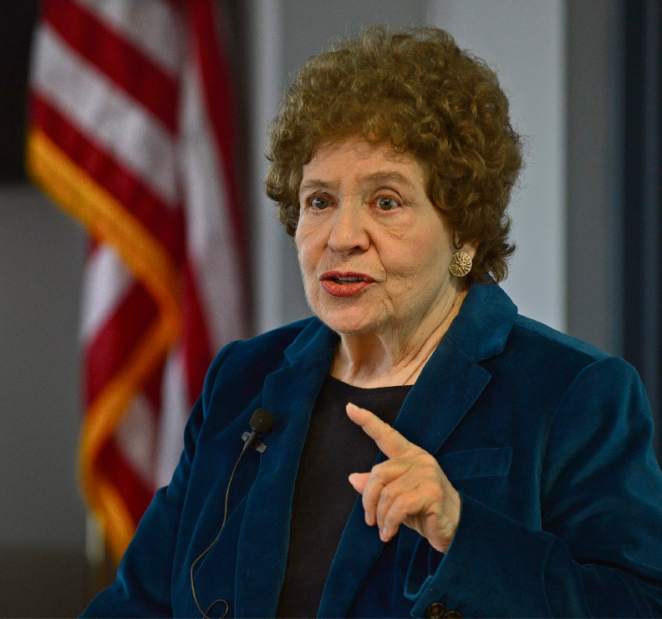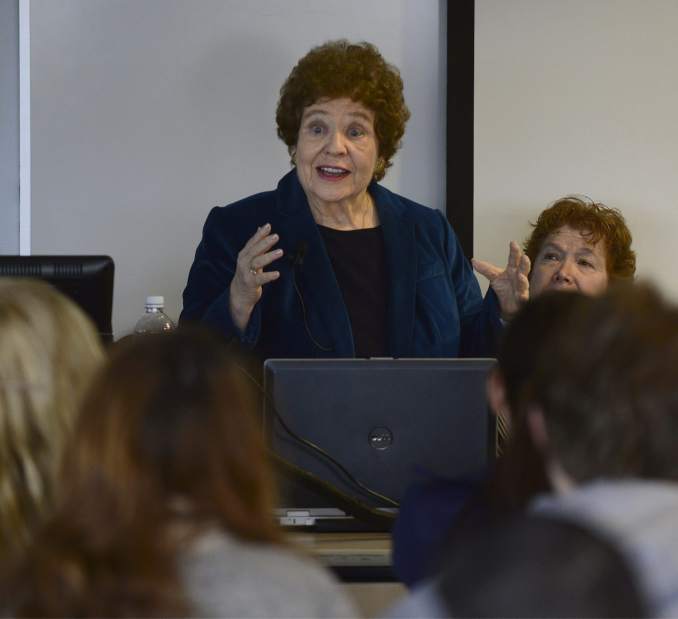Pittsburgh woman, native of Greece recounts her experience during the Holocaust
For Yolanda Avram Willis, pretending she wasn't Jewish in her native Greece during the Nazi occupation was easy. It was worrying about the fate of her Jewish Greek parents that worried her.
Willis, 81, of Pittsburgh spoke at Penn State New Kensington on Wednesday about her family's survival as Mediterranean Jews who hid their identity, blending in with Orthodox Christian families and successfully eluding the Nazis.
“Holocaust, In Remembrance” featured Willis, who spoke to a crowd of about 80 students, faculty members and visitors.
She is among 22 holocaust survivors who have presented their stories on campus, according to Lois Rubin, an emeritus associate professor of English there. Rubin has organized the program since 1992.
“I was fortunate to spend my childhood in the safe, comfortable setting of Pittsburgh at a time, the early 1940s, when 1.5 million Jewish children were being killed in Europe,” she said.
Willis credited the survival of her family to the compassion and cleverness of Greek Christians. Greek Archbishop Damaskinos Papandreou protested Jewish deportations and instructed his flock to take in and protect Greek Jews. Athens police Chief Angelos Evert forged fake identification cards.
Both men saved thousands of Greek Jews.
“We were fortunate and blessed,” Willis said.
She went on to attend American College in Athens and the University of Wisconsin-Madison, where she earned a master's degree in chemistry and a doctorate in sociology.
“The Christian Greeks — they risked their lives for us,” Willis said.
Born in Salonika, Greece, in 1934, Willis was 6 years old when the Axis powers invaded Greece. Her family and other Jews initially fled to Crete.
Willis' father moved the family and searched for work. But when German paratroopers stormed Crete, Willis, her family and others took refuge in the mountains.
“When we went to the mountains, my father was given a black mule,” Willis said. “But over our heads were the Nazi planes.” She referred to the German paratroopers as “the umbrellas.”
“The women were urban and wore sandals, and I wore sandals to climb the mountains,” she said.
“I remember looking down at the brown dirt caked on my socks sticking out of the sandals,” Willis said.
They found a chapel and temporarily sought refuge in a cave, but slept in the open on soft branches covered by army blankets, she remembered.
But the Germans wanted Greek residents to go back to the towns to provide services for the army, according to Willis.
So her family, blending with an Orthodox Christian family, returned to the cities of Greece.
She remembers her mother and one of the Christian family mothers visiting a Christian chapel twice a day, which was across from a Gestapo station.
“Those women had nerves of steel,” Willis said.
The family made its way to Athens. Unfortunately, people came to recognize Willis' father, Salvatore Avram, and the family would move. He decided they should split up for safety. Willis and her brother Yannis lived with two Greek Christian Orthodox families. Her parents portrayed themselves as childless.
The longest she went without seeing her father was six months.
“At one point, I forgot what he looked like,” said Willis.
“I unplugged my emotions,” she said. “I didn't want to be a burden to the people who were sheltering me, and I played along.”
After pretending to be non-Jewish for about four years, the Avrams reunited when Greece was liberated in 1944.
Although an estimated 87 percent of the nation's Jewish population — 60,000 to 70,000 Greek Jews — died during the Holocaust, 10,000 survived, largely due to the Greek people's refusal to cooperate with German plans for deportations, according to the International Raoul Wallenberg Foundation.
Willis talked about her plight but also told stories of other Jews in Greece making it, such as the 275 Jews on the Greek Island of Zakynthos.
“I don't know if there's anywhere else in Europe where such miracles occurred,” she said.
In a few months, Willis will release a book on her story, “A Hidden Child in Greece: Rescue Stories of the Holocaust,” published by Author House Publishing Co.
Mary Ann Thomas is a Tribune-Review staff writer. She can be reached at mthomas@tribweb.com.


